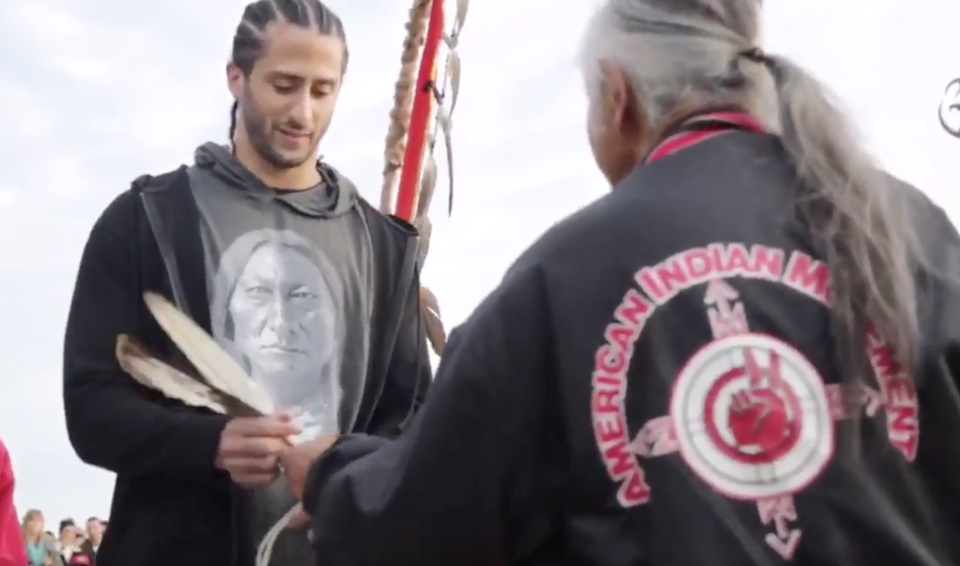Colin Kaepernick joins Native Americans for UnThanksgiving Day protest on Alcatraz

Colin Kaepernick, the American football star whose “kneeling protest” sparked a national debate, has travelled to Alcatraz Island to join Native Americans protesting the genocide they say is represented by Thanksgiving Day.
The 30-year-old made a surprise visit to the site of the former Alcatraz Federal Penitentiary to join indigenous people who occupied the island off the coast of San Francisco between 1969 and 1971. Since then, there has been an annual sunrise gathering to highlight the deadly, destructive impact on indigenous people of the arrival in America of European colonisers more than 400 years ago.
The former San Francisco 49ers quarterback was seen on video receiving two eagle feathers from a Native American elder before delivering a brief speech at the UnThanksgiving Day event.
Today, I was on Alcatraz Island at the Indigenous People’s Sunrise Gathering, in solidarity with those celebrating their culture and paying respects to those that participated in the 19 month occupation of Alcatraz in an effort to force 🇺🇸 to honor the Treaty of Fort Laramie. pic.twitter.com/KdNtY3dp72
— Colin Kaepernick (@Kaepernick7)
“I’m very humbled to share this space with all of you,” he said.
“Our fight is the same fight. We’re all fighting for our justice, for our freedom. And realising that we’re in this fight together makes us all the more powerful.”
The sports star has been at the centre of a furore since refusing last year to stand for the playing of the national anthem in order to protest the treatment of people of colour. His move followed the high-profile deaths in custody of a number of black suspects at the hands of police forces across the country.
While his actions have received widespread support, President Donald Trump attacked the move and used the phrase “son of a b***h” when talking about those involved.
Morning Star Gali, one of the event’s organisers and a member of Pit River tribe, told The Independent they had no advance notice the sports start was even among the 4,500 people present on Thursday morning.
“I was the MC and it was still dark and we couldn’t see anything. Then one of my co-workers told me he was there,” she said. “I just said ‘we had a relative among us called Colin Kaepernick and I trust that as good relatives we’re not going to crowd him too much and give him some space’.”
She said the NFL star was set to leave but that one of the indigenous elders, Fred Short, wished to present him with two ceremonial feathers. After he had received them, the footballer picked up the microphone and delivered his address.
Later, he posted the video on Twitter and explained why he had taken part.
“Today, I was on Alcatraz Island at the Indigenous People’s Sunrise Gathering, in solidarity with those celebrating their culture and paying respects to those that participated in the 19 month occupation of Alcatraz in an effort to force the US to honour the Treaty of Fort Laramie,” wrote Kaepernick, who was recently named GQ’s Citizen of the Year.
While the presence of the sports star was celebrated by the activists, it sparked anger among a number of conservatives, many of whom said he was “a traitor”.
Kaya Jones, a musician, said on Twitter: “He’s a traitor against his own country and people. Seriously like wow dude that girl really messed your head up but good. You have no job and have single handedly ruined a sport.”
He’s a traitor against his own country and people. Seriously 😒 like wow dude that girl really messed your head up but good. You have no job and have single handedly ruined a sport https://t.co/ixPXavTzo1
— KAYA (@KayaJones)
Grant Kidney, who describes himself as a nationalist and a blogger, called Kaepernick, a “degenerate”.
Shannon Burke, a talk show host from Atlanta, wrote: “Wow! Can he make himself any more unemployable! Why not sacrifice a white baby?”
The occupation of the island led by Mohawk activist Richard Oakes and Native American college students. It was done to draw attention to what they said was the federal government’s breaking of the 1869 Treaty of Fort Laramie.
The treaty, signed in Wyoming’s Fort Laramie between the US government and various indigenous tribes, ceded large swathes of land to the groups in order to the bring an end to the Powder River War, which had raged for two years between federal troops and fighters from the Lakota, Cheyenne and Arapaho tribes.

Indigenous people have long argued the treaty was quickly breached by the government, when it passed a subsequent act of Congress in 1878. In 1980, the US Supreme Court ruled the government had indeed taken the land illegally from the indigenous tribes.
“The 1877 Act effected a taking of tribal property, property which had been set aside for the exclusive occupation of the Sioux by the Fort Laramie Treaty of 1868,” the court wrote.
“That taking implied an obligation on the part of the government to make just compensation to the Sioux Nation, and that obligation, including an award of interest, must now, at last, be paid.”
Rather than taking the compensation the court ordered, the Sioux have continued to demand the return of the territory taken from them.
Ms Gali, said the occupation of Alcatraz had been a seminal moment in the struggle for justice by indigenous people.
She said: “It spoke to all tribes across the country and encouraged indigenous people around the world to stand up and resist.”
Read more
Why many American cities are shunning Columbus Day
US city votes to celebrate Indigenous Peoples’ Day on Columbus Day
Indigenous Sami people convince pension fund to ditch Dakota pipeline

